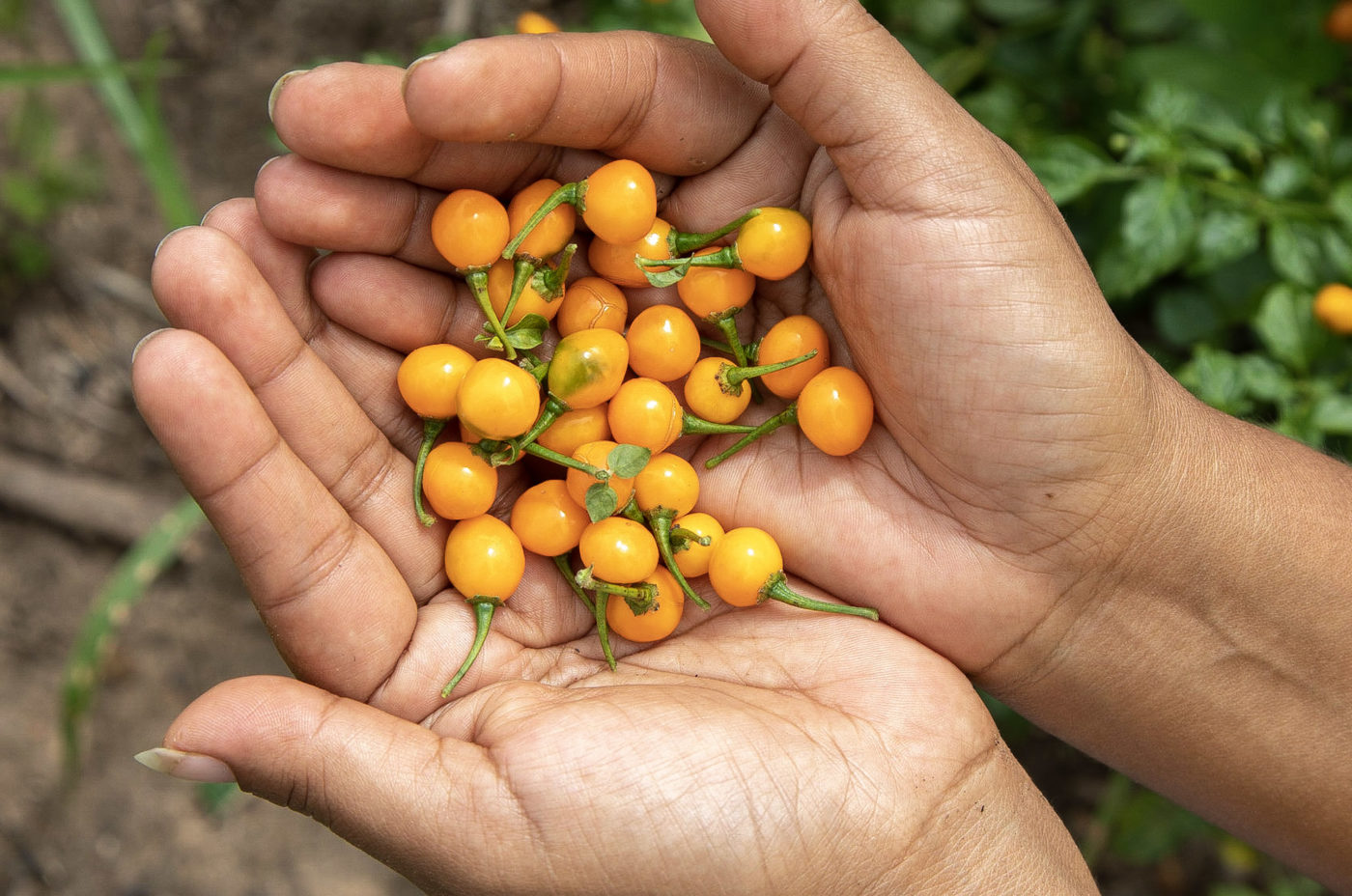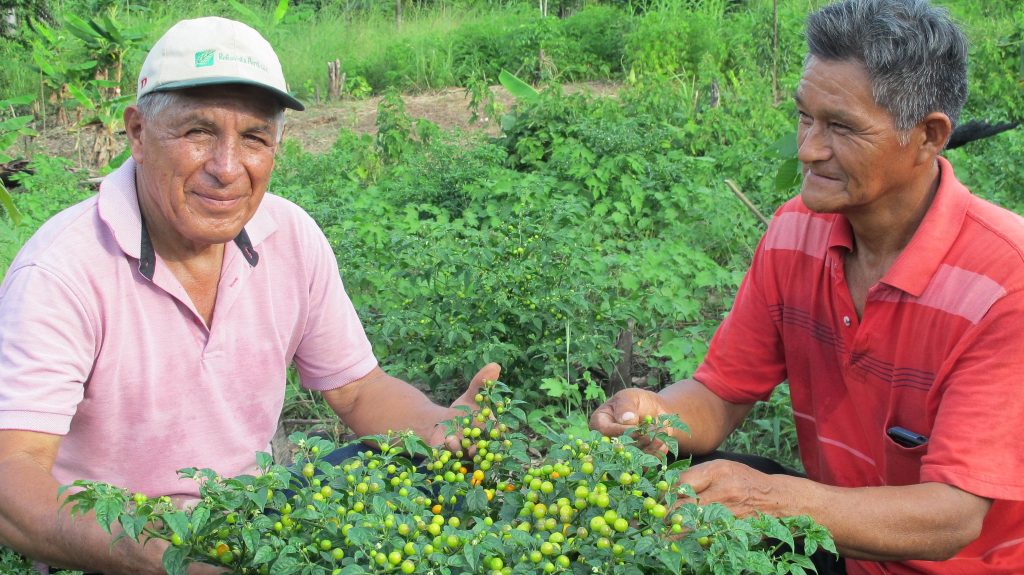By Virginia Cross
A traditional chilli pepper found on tables across the Peruvian Amazon is on its way to the U.K, thanks to the English non-profit Plant Your Future. Spicing up dishes with some of this Amazon heat connects straight back to farmers working to restore the rainforest.
This tiny pepper, known as ají charapita, hits 30,000-50,000 on the Scoville scale (10 times hotter than a jalapeño) and spices up rice, yuca, and plantain dishes common to the Peruvian Amazon. While a typical preparation of ají charapita in Peru would likely mix raw onion slivers, lime juice, and the charapita pepper, Plant Your Future worked with a chef in the U.K. to develop a recipe that would be feasible to transport while still reflecting the preparation and flavor of the Amazonian staple.
Charapita chillies, fresh or bottled as hot sauce, are extremely rare, perhaps non-existent throughout the E.U. According to Jenny Henman, Chairman and Founder of Plant Your Future, charapita is “a type of chilli pepper that [hasn’t] been in the U.K. before.”
While charapita chilli has culinary potential abroad, especially with the rising interest in Peruvian gastronomy, Plant Your Future has invested in charapita as a means to provide  a direct income to Peruvian farmers in the process of reforesting degraded and deforested land. For the past seven years, Plant Your Future has worked with Peruvian farmers in the provinces of Loreto and Ucayali to plant and raise various species of fruit trees, including cacao, lime, and avocado. As these trees can take years to mature and produce a viable product, Plant Your Future saw the opportunity to encourage a product that could be grown and harvested in months.
a direct income to Peruvian farmers in the process of reforesting degraded and deforested land. For the past seven years, Plant Your Future has worked with Peruvian farmers in the provinces of Loreto and Ucayali to plant and raise various species of fruit trees, including cacao, lime, and avocado. As these trees can take years to mature and produce a viable product, Plant Your Future saw the opportunity to encourage a product that could be grown and harvested in months.
Charapita bushes can be planted alongside orchard trees, giving farmers a prompt source of income as they wait the five-plus years for the trees “to start deriving a proper harvest,” explained Henman. “Charapita chillies are really immediate, high value, small, [and] easy to transport.”
In a region where many local farmers earn unpredictable wages from slash-and-burn agriculture or ranching, Plant Your Future promotes reforestation efforts by offering farmers a sustainable and reliable source of income. Thanks to the upcoming Charapita Hot Chilli Sauce, the farmers “are selling [charapita] in a much bigger quantity than they would normally sell, at a fair price that we’ve agreed ahead of time,” said Henman.
If farmers can securely depend on income from charapita and the orchard trees, Plant Your Future hopes that more “farmers will stop deforesting new bits of rainforest,” said Henman. “That was the wider thinking behind this.”
 After seven years of growing fruit trees, many farmers involved with Plant Your Future are beginning to see the effects of their reforestation efforts. As the orchard trees have matured, locals are noticing wildlife return to the previously-degraded areas, including monkeys, owls, and other bird species.
After seven years of growing fruit trees, many farmers involved with Plant Your Future are beginning to see the effects of their reforestation efforts. As the orchard trees have matured, locals are noticing wildlife return to the previously-degraded areas, including monkeys, owls, and other bird species.
“The farmers talk quite a bit about [the wildlife coming back],” said Henman. “They’re feeling a great sense of hope and excitement.”
As partners with Plant Your Future, farmers involved in the program also participate in workshops, receive financial support, and learn how to bring their products to national and international markets. The organization collaborates with farmers to understand which species the farmers want to plant while also offering technical advice and guidance. Guanábana (custard apple) and uvilla, for example, are popular fruits amongst the farmers, but are delicate to transport and spoil quickly.
“Often, the farmers are very enthusiastic and really positive [about a product], but you want to make sure they’re successful,” said Henman. “We want to take into account what they want with what we actually think might work.”
The charapita hot sauce, expected to reach the UK market by December 2018, looks to be the ideal combination of local expertise and global marketability. Charapita is both familiar to the Peruvian farmers and appealing to spicy food lovers around the world.

In April 2018, Plant Your Future presented Charapita Hot Chilli Sauce at Natural and Organic Food London, an annual trade show attended by over 10,000 people in the health food industry. The Peruvian Embassy in London invited Plant Your Future to exhibit in their Peruvian pavilion, and Charapita Hot Chilli Sauce participated alongside seven other Peruvian products. This was Plant Your Future’s first major showcase of their spicy Amazonian sauce.
“We had a little stand in the [Peruvian] pavilion, but it was really well received,” said Henman. “We were really pleased with people’s response to the taste and also to the branding.”
While the 100-mL bottle of Charapita Hot Chilli Sauce is ideal for home cooks, Henman also hopes to offer the hot sauce to London’s thriving Peruvian restaurants. As charapita is challenging to export fresh, Plant Your Future anticipates that Peruvian restaurants around London could incorporate the Charapita Hot Chilli Sauce in their menus, as part of the growing rainforest-to-table movement around the world.
Charapita Chilli Hot Sauce will be available online and through local shops in the U.K. Sign up to the Charapita Chilli newsletter here or follow @charapitachilli on Instagram to be the first to know when the sauce is ready for purchase.
(All photos courtesy of Plant Your Future.)
Charapita Tomato Salsa
Ingredients
- 450g (1lb.) tomatoes
- 1/2 red onion or 1/2 shallot
- Small bunch of fresh coriander (cilantro)
- 1-2 tbsp tomato puree
- Juice of 1 lime
- Juice of half a lemon
- 1 tsp – 1 tbsp Charapita Hot Chilli Sauce, to taste
- ½ tsp sea salt and pepper, to taste
Method
- First, peel the tomatoes by placing them in a large bowl and cover with boiling water. Leave them to stand for around 5 minutes before lifting them out one at a time. Carefully pierce the skin with a sharp knife and remove the skin.
- Roughly cut the shallot. If using onion, rinse in a colander under running water. Place all of the ingredients, except for the Charapita Hot Chilli Sauce, in a food processor and pulse briefly to a coarse mixture.
- Add Charapita Hot Chilli Sauce, salt, and pepper to taste.
- Store in an airtight jar and keep chilled in the fridge for up to 3 days.



It’s very cool that you are doing such wonderful things. Recycling and reusing unwanted products is a great idea to minimize your environmental impact. The most important thing is that if every person is engaged in protecting the environment from garbage, our world will become cleaner and better.